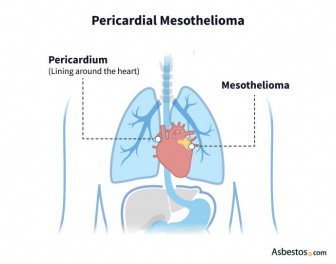
Get answers about treatment, top doctors, and financial support from the nation’s most trusted mesothelioma resource.
Get Your Free GuidePericardial mesothelioma is a very rare cancer that forms in the pericardium, or lining of the heart. Tumors in the heart are very rare. Cardiac (heart) tumors are often caused by metastasis.

Pericardial mesothelioma is a rare cancer that affects the heart’s lining, the pericardium. Fewer than 1% of all types of mesothelioma are pericardial. In fact, fewer than 150 cases of pericardial mesothelioma exist in medical literature.
For most people with mesothelioma, asbestos exposure is the cause. But the link between asbestos and pericardial mesothelioma is still being studied. Researchers are working to understand how asbestos fibers reach the heart.
This cancer usually affects people between 50 and 70 years of age. It’s more common in men than in women. Symptoms appear at a later stage and can mimic other heart disorders. These can include chest pain, fatigue and shortness of breath. Diagnosis is challenging due to these similar symptoms.
Key Facts About Pericardial Mesothelioma
Pericardial treatment options include surgery and chemotherapy. Some patients elect no treatment. Only a few patients receive radiation therapy. This treatment carries a higher risk near the heart.
Pericardial mesothelioma symptoms are often vague and cardiac-related. Most commonly reported are chest pain, shortness of breath and irregular heartbeat because of tumors and fluid buildup in the pericardial sac, called pericardial effusion. This can also lead to heart palpitations or heart failure.
Common Symptoms of Pericardial Mesothelioma
If you’re experiencing symptoms, schedule an appointment with your doctor immediately. Often, simple screening tests can lead to further imaging, including a chest X-ray, CT scan or echocardiogram (heart ultrasound), which can detect fluid in the pericardial sac, thickening or abnormal masses.
If you’re experiencing these symptoms and have a history of asbestos exposure, schedule an appointment with a specialist for an accurate diagnosis.
Worsening symptoms occur as tumors grow and put more pressure on the heart and surrounding structures. These advanced signs indicate the disease has progressed, affecting both cardiovascular function and overall quality of life.
Advanced Symptoms of Pericardial Mesothelioma
One documented case reported in JACC Journals in October 2025 involved a 73-year-old man who experienced recurring fevers, chills, night sweats and chest pain for 9 months before doctors diagnosed pericardial mesothelioma. His symptoms worsened over time, eventually affecting his heart’s ability to pump blood effectively and causing pericardial effusions. This case demonstrates how pericardial mesothelioma symptoms can intensify gradually and may initially resemble other heart or inflammatory conditions, making early diagnosis challenging.

Get answers about treatment, top doctors, and financial support from the nation’s most trusted mesothelioma resource.
Get Your Free GuideAn accurate pericardial mesothelioma diagnosis requires imaging and a tissue biopsy of the pericardium or pericardial fluid. Cardiologists and mesothelioma specialists work together to confirm the disease, often after other heart disorders have been ruled out.
Steps in Diagnosing Pericardial Mesothelioma
Pericardial tumors generally aren’t localized. They tend to cover most of the heart. This cancer type accounts for approximately 50% of all pericardial tumors.
Unfortunately, most pericardial mesothelioma cases are discovered during an autopsy. Doctors only diagnose about 10% to 20% of cases before a patient dies. This makes seeking medical advice as soon as you experience symptoms important, as well as discussing exposure to asbestos. Doctors will assess your symptoms and clinical findings to determine treatment.

Getting a second opinion is especially important to prevent receiving a misdiagnosis of a more common illness. Pericardial mesothelioma is very rare, but specialists who focus on mesothelioma can help you move forward with the right treatment as quickly as possible.
Common Pericardial Mesothelioma Misdiagnoses
If you have received a diagnosis of pericardial mesothelioma, meeting with a specialist gives you access to the latest knowledge and treatment options. Mesothelioma oncologists and cardiothoracic surgeons not only confirm the diagnosis, but they also design care plans tailored to your needs. These experts can connect you with innovative therapies and clinical trials that may improve outcomes.
Insight From a Mesothelioma Doctor
It’s not unusual to diagnose pericardial mesothelioma as an incidental finding. You’re going to treat pericardial effusion. You’re not suspecting mesothelioma. Pericardial mesothelioma accounts for 1% to 2% of all mesothelioma, which is a rare disease.
Treatment for pericardial mesothelioma is most often surgery and chemotherapy, which can extend survival. Your doctor may also include palliative procedures to manage fluid buildup around the heart and improve quality of life. The heart lining rests close to the heart and limits treatment options.
Surgery is the most effective treatment for this cancer, but more than 50% of patients aren’t eligible. In rare cases of an early diagnosis, surgery may be able to remove most of the tumor. But often there is tumor left behind. It’s therefore important to follow up with chemo or immunotherapy to treat the residual tumor.
Palliative treatment, such as fine needle aspiration, which removes fluid around the heart, can ease symptoms. Radiation therapy is considered minimally beneficial for this rare cancer. It’s difficult to administer without harming the heart.
The primary surgical treatment options for pericardial mesothelioma are pericardiectomy and tumor resection. These procedures aim to relieve pressure on the heart and reduce symptoms.
Treatment Details
Surgery can relieve chest pain and shortness of breath caused by fluid buildup around the heart. Doctors often pair surgical resection with chemotherapy to help control disease recurrence.

Connect with top-rated doctors specializing in mesothelioma treatment, who will personalize treatment options based on your diagnosis.
Find Your DoctorChemotherapy and immunotherapy are systemic therapies that can help shrink tumors and slow disease progression in pericardial mesothelioma. While benefits are limited compared to other mesothelioma types, some people have responded well to treatment.
Treatment Details
Chemo cycles last several weeks, your oncology team will closely monitor side effects such as fatigue, nausea and lowered immunity. Combining chemo with surgery or immunotherapy may lead to better symptom control and improved outcomes for eligible patients.
Fluid buildup in the pericardium is the primary cause of symptoms. The aim of palliative treatment options is to minimize pain and reduce symptoms.
Treatment Details
Palliative procedures can greatly improve day-to-day function and comfort for patients with pericardial mesothelioma. Doctors often use palliative care alongside chemotherapy or immunotherapy to manage symptoms and slow disease progression.
Studies also show combining therapies, or multimodal treatment, offers the best outcomes for eligible patients. A 2024 Memorial Sloan Kettering trial on pericardial mesothelioma found that multimodal therapy of surgery, chemo and radiation yielded a median survival of 70.3 months versus 8.2 months without the therapy.
Median Survival With Multimodal Therapy
Source: 2024 Memorial Sloan Kettering Trial
Median Survival Without Multimodal Therapy
Source: 2024 Memorial Sloan Kettering Trial
Pericardial mesothelioma prognosis is generally poor compared to peritoneal or pleural mesothelioma, with a median survival of about 6 to 10 months, though a minority of patients live a year or longer with treatment.
A recent study in Seminars in Thoracic and Cardiovascular Surgery notes 22% of pericardial mesothelioma patients live for 1 year or more, and the 5-year survival rate is 9%. Research shows positive results from combined therapy and surgery for improved mesothelioma life expectancy.
These averages and statistics can’t predict your pericardial mesothelioma prognosis. Your specialist will evaluate your cancer stage, overall health and access to treatment for the best outcome. Palliative care can help control symptoms and clinical trials offer promising new therapeutic options.
Perspective from a Patient Advocate
We speak with 1-3 pericardial mesothelioma patients or their loved ones each year. This is an extremely rare diagnosis that most doctors have not seen in their careers. With the help of our Doctor Match program, we are able to connect these patients to world-renowned experts to explore treating this rare diagnosis.
Practical strategies and a strong support network can reduce stress, ease symptoms and help you feel more in control during treatment. These options can help you cope with pericardial mesothelioma, providing practical help and emotional relief during treatment.
Resources for Survivors and Loved Ones
Our Patient Advocates can connect you to vital resources, offer support and help you understand your diagnosis and treatment options. Pericardial mesothelioma is a difficult diagnosis, but you’re not alone. Taking care of your physical and mental health needs can ease the impacts of the disease.
Most cases aren’t hereditary. Certain rare genetic mutations such as BAP1 can increase the likelihood of risk in certain families. When multiple family members have mesothelioma or other cancers, it may be worthwhile to speak to a genetic counselor to see if testing is appropriate for you.
Seek a pericardial mesothelioma expert and a cardiologist who specializes in pericardial disease. Your treatment team should generally include a cardiothoracic surgeon, medical oncologist and radiation oncologist, in addition to palliative care for symptom support and a nurse navigator for logistical support.
Contact your hospital’s pathology department or medical records and request that your pathology slides and blocks be sent to a mesothelioma center for review. The receiving physician’s office will provide shipping instructions and necessary documentation; your hospital will need to package and send out the appropriate materials. In the meantime, keep copies of your pathology report and any imaging so the second opinion team has everything they need.
Stay up-to-date on treatment, research, clinical trials, doctors and survivors
The information on this website is proprietary and protected. It is not a substitute for professional medical advice, diagnosis or treatment. Any unauthorized or illegal use, copying or dissemination will be prosecuted. Please read our privacy policy and terms of service for more information about our website.
This website and its content may be deemed attorney advertising. Prior results do not predict a similar outcome.
The Mesothelioma Center’s claim as the most trusted resource is based on our more than 150 5-star Google and BBB reviews. Our organization also helps more than half of all mesothelioma patients annually diagnosed.
Your web browser is no longer supported by Microsoft. Update your browser for more security, speed and compatibility.
If you are looking for mesothelioma support, please contact our Patient Advocates at (855) 404-4592
The Mesothelioma Center at Asbestos.com has provided patients and their loved ones the most updated and reliable information on mesothelioma and asbestos exposure since 2006.
Our team of Patient Advocates includes a medical doctor, a registered nurse, health services administrators, veterans, VA-accredited Claims Agents, an oncology patient navigator and hospice care expert. Their combined expertise means we help any mesothelioma patient or loved one through every step of their cancer journey.
More than 30 contributors, including mesothelioma doctors, survivors, health care professionals and other experts, have peer-reviewed our website and written unique research-driven articles to ensure you get the highest-quality medical and health information.
My family has only the highest compliment for the assistance and support that we received from The Mesothelioma Center. This is a staff of compassionate and knowledgeable individuals who respect what your family is experiencing and who go the extra mile to make an unfortunate diagnosis less stressful. Information and assistance were provided by The Mesothelioma Center at no cost to our family.LashawnMesothelioma patient’s daughter


Asbestos.com. (2026, February 9). Pericardial Mesothelioma. Retrieved February 13, 2026, from https://www.asbestos.com/mesothelioma/pericardial/
"Pericardial Mesothelioma." Asbestos.com, 9 Feb 2026, https://www.asbestos.com/mesothelioma/pericardial/.
Asbestos.com. "Pericardial Mesothelioma." Last modified February 9, 2026. https://www.asbestos.com/mesothelioma/pericardial/.

Dr. Wickii Vigneswaran is a thoracic surgeon at James A. Haley Veterans' Hospital in Tampa, Florida. He is also a professor at the University of South Florida Morsani College of Medicine. Vigneswaran is an internationally recognized expert in the surgical management of diseases affecting the lungs, mediastinum and pleura. He is the former director of the Lung and Lung-Heart Transplantation team at the University of Chicago Medical Center.
Our fact-checking process begins with a thorough review of all sources to ensure they are high quality. Then we cross-check the facts with original medical or scientific reports published by those sources, or we validate the facts with reputable news organizations, medical and scientific experts and other health experts. Each page includes all sources for full transparency.
Please read our editorial guidelines to learn more about our content creation and review process.
